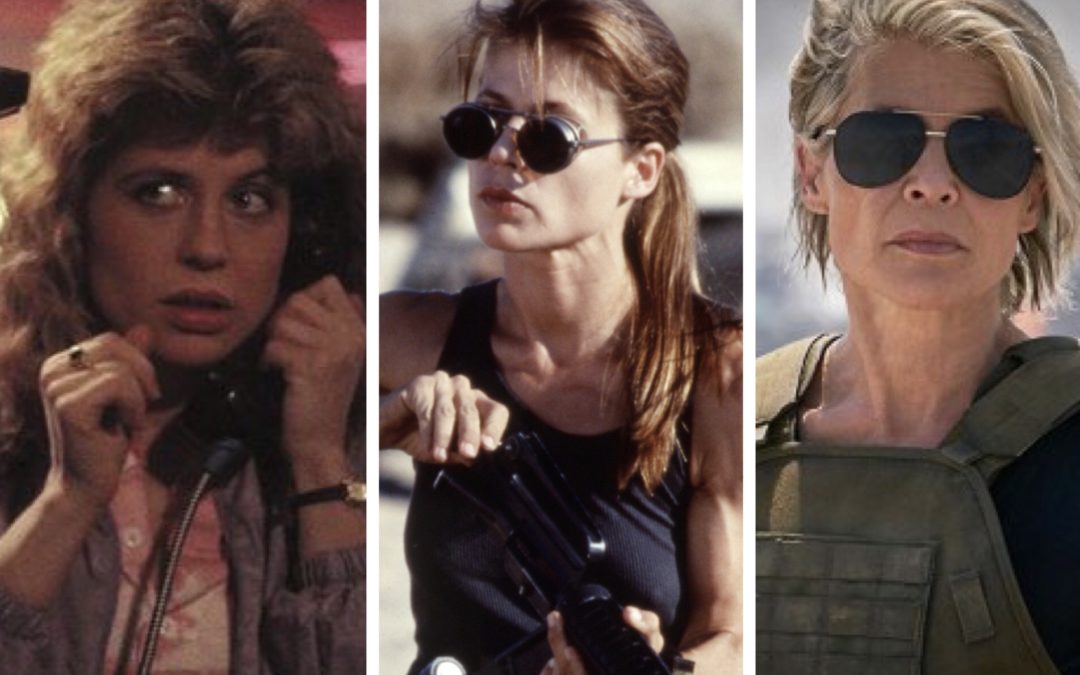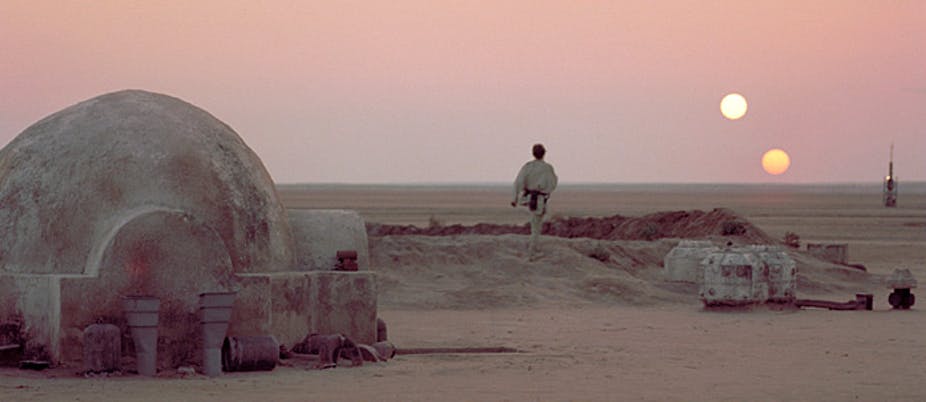
Terminator: Sarah Connor’s Legacy
The face of the Terminator franchise has been Arnold Schwarzenegger, and I get it. Arnie is one of the big charismatic icons of Hollywood and the Terminator role was one of his best. However, after watching Terminator: Dark Fate, and after seeing Sarah Connor again, I couldn’t help but think that Linda Hamilton is the real face of Terminator.
Sarah Connor has been what’s missing from these movies.
Here we have one of the greatest heroines of all time returning to the big screen to reprise her role as Sarah Connor. Even at age 63, Linda Hamilton’s presence and star power as Sarah Connor are amazing. The bad news? Her presence and performance in the film were the only things that sustained my interest despite surprisingly boring action, mottled plots, and bizarre character arcs.
Dark Fate isn’t a great movie. Indeed, it’s a mess and I’m predicting initial box office success from Arnie & Linda star power, but poor reviews from fans will probably catch up to this one.
At one point, Sarah Connor says she saved the lives of three billion people by stopping an apocalyptic future. One of the new heroines, named Grace (played by Mackenzie Davis), stares back with a blank face. “You’re welcome,” says Sarah, as if cueing her counterpart that a “thank you” would be nice. But is it? Because well, as far as Grace can tell, nothing changed. A new Terminator is after them, so…thanks?
As fresh and diverse faces, the two new heroines do a decent job and hold their own besides the big stars. But Dani and Grace’s storyline have to make room for the presence of an undisputed heroine, Sarah Connor, who has her own agenda. Instead of the old stars grooming the new stars, it felt more like two movies crashed into each other with two sets of stars competing for relevance. The heroines don’t exactly work well together and cooperate only begrudgingly. Each heroine didn’t exactly see the need for the other.
By the end of Dark Fate, the patchwork of movie themes finally fell apart. Despite a solid effort, the two new heroines probably won’t leave a lasting impression, which is a shame. The terminator saga wasn’t really their story after all. The film, itself, didn’t seem to know that until the end when Sarah Connor carried the film on her shoulders.
Terminator: Dark Fate showcases two problems in Hollywood regarding heroines: one, the general lack of follow-through when a great heroine emerges. And two, a true phobia in portraying any weaknesses in younger heroines, focusing more on convincing action over character development.
Why did we ever abandon Sarah Connor in the first place? I nearly forgot that the terminator universe is actually a heroine-centric story, and Sarah was the unquestionable heroine of that universe. The franchise instead followed Arnold Schwarzenegger’s terminator and abandoned Sarah Connor. Silence of the Lambs did the same thing, opting to focus on Hannibal Lecter and abandoning Clarice Starling. Bad writing swamped Ripley in follow up films in the Aliens franchise. And then, when Elizabeth Shaw emerged as a solid heroine in Prometheus, the franchise killed her off and instead focused on Michael Fassbender’s android character, David.
Dumb. The follow-up movies were bad, and I feel like we squandered serious opportunities to elevate our favorite heroines.
I realize that in some cases, the actresses refused to reprise their role. But I have a feeling that the actresses also had little faith in Hollywood writers. As a result, we lost touch with great heroine archetypes. Could you imagine if Luke Skywalker disappeared after A New Hope and the films focused on mindless action with just Han Solo? Serious cultural loss. Why wouldn’t the studios hire the best writers out there and keep these heroines going? Linda Hamilton was more than capable of pulling off the big trilogy for Sarah Connor and the terminator.
Heroic women are powerful figures in culture. We need to see more of them, but we also need to get it right. This brings me to my second point. Dark Fate does deliver tough women in major action sequences. That alone might satisfy some people who like seeing women pummeling the world into submission with kicks and punches. But I don’t need to be convinced that women are tough. I don’t need to be sold on the idea that women are leaders and fully sovereign individuals. I mean, do you? What about the relatable woman behind the heroine? I want to connect with her emotionally. I want to know that she often doubts herself as I do. I want to know she can be beaten as I can. And then I want to follow her every step of the way as she stands up against the most formidable villains anyway.
As I hope I can.
Dark Fate presents two new heroines and neither gets a chance to fail or grow. Grace actually models the virtues of individualism above parenthood and rejects the notion that children, particularly sons, are important human beings worthy of protecting. An odd position for a heroic figure to take. And ultimately, this seems to be the opposite message of the terminator saga. That said, Grace was a convincing action star but she’s left vulnerable to merely being a symbolic “tough woman.”
The other heroine, Dani, has far more potential since she’s relatable. She’s a real person from Mexico who cares about her family and feels overwhelmed by the unfolding events. The people around her are more capable than she is and Dani must grow if she’s to face the challenges ahead. Her story, though, gets lost in the film, so she never really gets a chance to convince us that she’ll become a revolutionary warrior.
Neither of these new heroines were challenged beyond the physical chase from a terminator. None failed in a way that required growth or change. And neither will likely stand the test of time.
I care about heroines very much. I believe our society and culture benefits from having great heroes and equally great heroines. I believe that heroines might have some answers for overcoming conflicts in the 21st Century and beyond. So, my message to Hollywood after seeing Sarah Connor again?
Don’t abandon our great heroines when they emerge.
And don’t dumb down our new heroines.
Despite the below-average film, I think Sarah Connor’s legacy has been preserved. In a recent poll I conducted on my Facebook page, Sarah Connor edged out Ripley in a head to head matchup, She’s big. I wish we had more of her. And I realize only too late that it was Sarah all along, not the menacing terminator, who actually carried my interest in the franchise.
